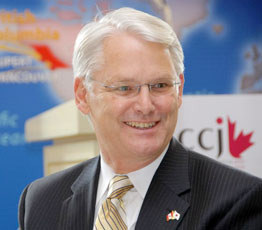It`s not easy being green ..
Jul 1st, 2008 | By Counterweights Editors | Category: Key Current Issues According to a report in the June 27 Globe and Mail: “Anger at soaring gas prices has supplanted fear about global warming as the No. 1 issue Canadians say is facing their country …The environment, last year’s top issue, has been pushed to No. 3 … This shift could make it more difficult for Liberal Leader Stephane Dion to sell the carbon-tax plan he unveiled last week …”
According to a report in the June 27 Globe and Mail: “Anger at soaring gas prices has supplanted fear about global warming as the No. 1 issue Canadians say is facing their country …The environment, last year’s top issue, has been pushed to No. 3 … This shift could make it more difficult for Liberal Leader Stephane Dion to sell the carbon-tax plan he unveiled last week …”
Yet in the best of all possible new green worlds these No. 1 and 3 issues ought to be part of the same big new syndrome – what the future-shock guru Alvin Toffler called an “eco-spasm” back in the mid 1970s, when we had the first premonitions of our current social and economic disease. Anger about soaring gas prices ought to be making it easier to sell new carbon-tax plans.
But do we have political leaders who can craft such scenarios in convincing ways, anywhere in North America? On June 29 Thomas Friedman also wrote in the New York Times: “I continue to be appalled at the gap between what is clearly going to be the next great global industry – renewable energy and clean power – and the inability of Congress and the administration to put in place the bold policies we need to ensure that America leads that industry.”
1. Some immediate negative reactions to Dion’s federal carbon tax plan in Canada …
 It could be that Stphane Dion’s federal carbon tax proposal in Canada suffers from concentrating too much on only one aspect of our current eco-spasm, so to speak. And it certainly bumps into some longstanding Canadian regional economic tensions in very politically awkward (and perhaps even impossible?) ways.
It could be that Stphane Dion’s federal carbon tax proposal in Canada suffers from concentrating too much on only one aspect of our current eco-spasm, so to speak. And it certainly bumps into some longstanding Canadian regional economic tensions in very politically awkward (and perhaps even impossible?) ways.
To start with: “Canada’s three northern premiers have vehemently rejected federal Liberal Leader Stephane Dion’s proposal for a carbon tax … Emerging from two days of meetings in Yellowknife on common issues, Northwest Territories Premier Floyd Roland, Yukon Premier Dennis Fentie and Nunavut Premier Paul Okalik agreed that Dion’s plan would be unfair to residents of the North …
“Okalik said he can appreciate that in some jurisdictions, where there are more alternatives available, such a tax might be an acceptable way of addressing [greenhouse gas] emissions … But in the North, there really are no alternatives for us in Nunavut to turn to, to get away from diesel generation for power and for heat … We’d rather focus on alternatives to get away from fossil fuels. But to add on a cost to very high fuel costs already is just not an option for homeowners in our territory.'”
And then, especially for a politician from the fading old central heartland of Ontario and Quebec, there’s the ancient bugbear of Western alienation: “Federal Conservatives and Liberals are accusing each other of purposely stoking resentment in Western Canada as Stephane Dion prepares to sell his national carbon tax proposal in Alberta, heart of the country’s energy industry and bastion of Conservative political support … When the Liberal leader heads to Calgary later this week [June 30July 4] he’ll have to face down what some experts call the bogeyman of East-West politics – Liberal Pierre Trudeau’s 1980-85 National Energy Program (NEP) … .
“Prime Minister Stephen Harper, a Calgary MP, has said the carbon tax would not only damage the West like the NEP but screw’ the rest of the country, too … With the premiers of the three northern territories, as well as Alberta and Saskatchewan all out swinging against the carbon tax, Dion appears headed for hostile territory.”
Officials from Alberta and Saskatchewan “reacted swiftly to Mr. Dion’s comments this week” that their provinces “will be affected the most by the plan because they account for about 40 per cent of Canada’s greenhouse-gas emissions … In addition to sharing Canada’s main oil reserves, the two Prairie provinces increasingly share a common political landscape. Together, they account for a massive blue swath on the Canadian electoral map. A small red blip marking Liberal MP Ralph Goodale’s urban Regina riding of Wascana is the only exception.”
Saskatchewan Energy and Resources Minister Bill Boyd, of the conservative Saskatchewan Party, “says that political map has a lot to do with Mr. Dion’s new policy … I think it’s clear that Mr. Dion has looked at that in a very crass political way and made the political calculation that there’s nothing for him to lose anyway,’ Mr. Boyd said. If he can take some of the wealth from Western Canada where he has no vote support whatsoever and redistribute it to Eastern Canada, he has a better chance of winning the next election.'”
(Of course, on assumptions such as Mr. Boyd’s, no one in Western Canada believes that dramatically rising oil and gas prices are in effect a grab at the hoary old wealth of Eastern Canada, to redistribute it to Western Canada. And that’s partly because after the wild rejection of Liberal Pierre Trudeau’s 1980-85 National Energy Program, the notion that Western Canada’s oil and gas is a national resource that ought to be sold in Eastern Canada – as opposed to the United States or China, say – has been banished from Canadian political debate.)
2. Gordon Campbell’s problems with his provincial carbon tax plan in BC …
 Western Canada, of course, includes the Pacific province of British Columbia, as well as Alberta and Saskatchewan. And here things are somewhat different again, because BC Premier Gordon Campbell’s new provincial carbon tax started working its own magic on Canada Day, July 1, 2008. The obvious big question on this front is just how would M. Dion’s federal carbon tax blend with Mr. Campbell’s provincial one?
Western Canada, of course, includes the Pacific province of British Columbia, as well as Alberta and Saskatchewan. And here things are somewhat different again, because BC Premier Gordon Campbell’s new provincial carbon tax started working its own magic on Canada Day, July 1, 2008. The obvious big question on this front is just how would M. Dion’s federal carbon tax blend with Mr. Campbell’s provincial one?
A similar issue arises in the case of a Quebec provincial carbon tax, and the Dion Liberals say they have good answers in both cases. Meanwhile: “Beginning July 1, the BC government will impose a tax on fossil fuels – in the case of gasoline, about 2.4 cents a litre – but will return all the revenue collected in the form of income and corporate tax cuts … A new Angus Reid Strategies poll found that 47 per cent of those surveyed said they were willing to pay higher taxes on fossil fuels if they also got an income tax cut, compared to 49 per cent who opposed the idea … Five per cent said they weren’t sure …
“The survey, which will be released today but was provided Thursday [June 26] to the Vancouver Sun, suggests the public isn’t yet sold on the carbon tax … But even more worrying for the government, the poll indicates far greater support for a proposal by NDP leader Carole James to tax industrial polluters at the source instead of imposing a tax on consumers.”
Meanwhile again: “In a last-minute blitz, the BC government is doing a hard sell on the carbon tax … On Friday [June 27], senior academics made the case for the controversial tax, which comes into effect next Tuesday [July 1] and will add more than two cents to a litre of gasoline … Premier Gordon Campbell hit the airwaves to plug his climate-change plan and explain why a carbon tax on fuel must go ahead …
“We have some parts of our province where the temperature is rising at two times what the global average is,’ Campbell told CKNW’s Bill Good on Friday [June 27]. And we can sit here and pretend there’s nothing we can do about it, and [climate change] doesn’t have anything to do about it. It does’ …
“At an event organized by the government’s Climate Action Secretariat, BC academics said the carbon tax is crucially important to reducing greenhouse-gas emissions … We all want to believe this is someone else’s fault. Charge the polluters,’ said UBC politics professor Kathryn Harrison. We are the polluters. We just cannot point the finger at someone else.'”
3. Envisioning a world of $200/barrel oil and all that …
 Abstract altruistic concern about greenhouse gas emissions is one thing, of course. But if something is finally going to mobilize a new green revolution of the sort 21st century Canadian Liberals Gordon Campbell and Stephane Dion are at least trying to help nudge ahead, it is more likely to be the kind of soaring gas prices that have “supplanted fear about global warming as the No. 1 issue Canadians say is facing their country.”
Abstract altruistic concern about greenhouse gas emissions is one thing, of course. But if something is finally going to mobilize a new green revolution of the sort 21st century Canadian Liberals Gordon Campbell and Stephane Dion are at least trying to help nudge ahead, it is more likely to be the kind of soaring gas prices that have “supplanted fear about global warming as the No. 1 issue Canadians say is facing their country.”
At first you say well, who wants to pay an additional 2.4 cents a litre of gas in carbon tax, when the price of gas is already soaring – even if Mr. Campbell’s BC government “will return all the revenue collected in the form of income and corporate tax cuts.” But then you start thinking about just what continuing dramatic increases in the price of oil and gas could mean for ordinary life in North America today, e.g., and you do start to see something like a green revolution, blowin’ in the apocryphall wind.
Take, as just one small case in point, Martin Zimmerman’s article on “Envisioning a world of $200-a-barrel oil” in the June 28 Los Angeles Times: “The more expensive oil gets, the more Katherine Carver’s life shrinks. She’s given up RV trips. She stays home most weekends. She’s scrapped her twice-a-month volunteer stint at a Malibu wildlife refuge – the trek from her home in Palmdale just got too expensive … How much higher would fuel prices have to go before she quit her job? Already, the 170-mile round-trip commute to her job with Los Angeles County Child Support Services in Commerce is costing her close to $1,000 a month – a fifth of her salary. It’s got the 55-year-old thinking about retirement.”
Zimmerman also notes that: “Nationwide, $200 oil and $7 gasoline would force Americans to take 10 million vehicles off the roads over the next four years, Jeff Rubin, chief economist at CIBC World Markets, wrote in a recent report.”
Some Canadians will recognize Jeff Rubin at CIBC World Markets as a domestic product of their own, and remember a related June 26 report by the Canadian Press: “two of Canada’s biggest banks say rising gasoline prices are going to have a major impact on U.S. driving habits … CIBC World Markets economist Jeff Rubin says gas prices in the U.S. will hit US$7 a gallon – the equivalent of C$1.86 a litre – two summers from now … Rubin says over the next four years we’re likely to see the greatest mass exodus of vehicles off America’s highways in history,’ with some 10 million fewer cars on the road by 2012 …
“Another report by Scotia Economics says Americans are opting for smaller more fuel-efficient cars over gas-guzzling SUVs and pickup trucks … Carlos Gomes, an auto industry specialist, says small cars now account for one-quarter of overall U.S. sales, up from 16 per cent last year … The meteoric rise in global crude oil, which was trading at US$138 a barrel on the New York Mercantile Exchange midday Thursday [June 26] has been a major factor in soaring pump prices.”
And then we have Robert Milton, chief executive officer of Air Canada’s parent company, telling us that: “Passengers are witnessing the end of an era of cheap airfares as record-high oil prices erode travel demand and reshape the world’s airline industry … Discount carriers are suffering more than most, but all airlines are feeling the heat from oil prices that have surged beyond $140 (U.S.) a barrel…
“This one is a truly global issue, and I think you’re going to see a lot of airlines disappear … The ones who are going to really have a problem are the airlines that have been trying to sell a low-fare proposition … Some carriers, especially those in Europe, revolutionized the industry with cheap regional fares, but with jet fuel bills soaring, the no-frills business model has come under attack … “Those airlines can’t offer low fares to that degree which will stimulate net new traffic because the fuel cost component of offering a fare is so high now that they just can’t get to that level of stimulation.”
4. Is there any light at the end of the tunnel?
 An “eco-spasm,” Alvin Toffler wrote in 1975 (with a bow to “Harold Strudler of the Institute for the Future”), is what happens when “systemic breakdowns aggravate economic disorder and economic disorder intensifies and accelerates systemic breakdowns, in which random’ ecological and military eruptions hammer at the economy from different directions.”
An “eco-spasm,” Alvin Toffler wrote in 1975 (with a bow to “Harold Strudler of the Institute for the Future”), is what happens when “systemic breakdowns aggravate economic disorder and economic disorder intensifies and accelerates systemic breakdowns, in which random’ ecological and military eruptions hammer at the economy from different directions.”
So now in the early 21st century we have soaring oil and gas prices, parts of British Columbia where the temperature is rising at two times the global average, wildfires in Northern California as I write, floods and other extreme weather events in many places, a credit crunch in a number of global and/or regional financial systems, senseless military conflicts in several locations, a growing food crisis in some parts of the world, and on and on and on …
As a way forward in all this chaos and confusion of the moment, Thomas Friedman is probably right when he talks about “what is clearly going to be the next great global industry – renewable energy and clean power.” And this must or at least may well be one main economic engine for the kind of forward-looking green revolution that Stephane Dion and Gordon Campbell are trying to help foster with their new carbon tax plans in Canada.
Say whatever else you like, but so far, as a practical matter, in the real world of politics and economics and all that, this green revolution does seem like pretty hard sledding – even if you take dramatically rising oil and gas prices as an essentially positive ultimate part of the biggest picture. But is there any light at the end of the tunnel? Something to at least give green revolutionaries some glimmer of hope for the longer term (in which we’ll all be dead, but at least our grandchildren will be alive)?
Well to start with, in Canada, the June 2829 weekend edition of Le Devoir in Quebec, ran a more or less upbeat report, headlined: “Revue de presse – Tout le monde au vert.” M. Dion is sometimes said to be less popular in his home province of Quebec than anywhere else in Canada. But that didn’t seem to stop Le Devoir from sounding something of a positive note about his federal carbon tax plans:
“Le chef libral Stphane Dion semble avoir remport un premier pari, celui d’imposer un dbat public sur un enjeu qui lui est cher: l’environnement. Il n’y en avait que pour son Tournant vert cette semaine dans les quotidiens. Son plan ne fait pas l’unanimit, mais le fait d’en avoir un et de forcer ainsi une discussion de fond sur un dossier crucial a t unanimement applaudi tandis que Stephen Harper s’est fait matraquer pour sa rponse initiale et son absence de plan crdible.”
And then the Monday, June 30 issue of the Globe and Mail in Ontario ran a column by Ottawa deep thinker Lawrence Martin, headlined “The Tory dilemma: a blue government in a green era.” And this opined that “green has mushroomed to become the all-encompassing issue of our age. It is the spirit of the times, the new ideology. Green tides spill over into everything and, in so doing, change our political dynamic, perhaps profoundly …
“National security? It’s a green issue – petro-rich authoritarian regimes feeding off our oil addiction. Economic security? Wacko energy prices, born of that same addiction to black instead of green, invite recessionary peril. Survival of the planet? It’s all about green. The great industrial challenge of our era? Emissions-free green energy … Nothing can be considered as the zeitgeist unless the United States is on to it. Today, the green focus in America is finally reaching critical mass. Watch as it increasingly becomes a centre point of the change campaign of Barack Obama, the zeitgeist candidate. Green, writes Thomas Friedman of the New York Times, could become the new red, white and blue … The spirit of the times is green and the new ideology is green and the dilemma for our governing Conservatives is this: They’re still blue.”
Mr. Martin goes on. He allows that the current Canadian “Grits’ green shift will be a hard sell. It leaves deep, troubling questions. Their leader has flip-flopped on carbon taxes. They have been bracing for some bad polls. But if, in the short term, it bites, in the long run, the Liberals are getting out front on the transformative issue of our time. Few saw Stphane Dion as a pacesetter. They’re starting to change their minds … How potentially significant is leading the parade on something like this? Think of the other great issues or sweeping trends and their political impacts. Think of the Cold War and the long-running security scare right through 9/11 and how the right was able to ride it. Think of the creation of the welfare state over four decades following the New Deal and how the left was able to ride that.”
And then Mr. Martin ends with: “The Liberal gambit leaves the New Democrats in a tough position as well. They argue that their cap-and-trade system is better than the green shift. Depending on what expert you listen to, they may be right. But the sweeping nature of the Liberal plan, the changing of the tax structure to accommodate the new times, gives the NDP the look of playing second fiddle … They and the Conservatives have a difficult task confronting them. Don’t be surprised, Tory sources are saying, if Mr. Harper changes tack in the fall and moves off his halting approach to the green tide with dramatic new measures of his own. Otherwise, he could be caught in a time warp. Old versus new. Political poison.”
At this point, you can be forgiven if you are suddenly starting to think, wait a minute! Haven’t we heard pretty much this story before – and in the quite recent past that we can still more or less remember? Stphane Dion was the green giant of the Canadian summer, and the Tories were going to have to come back to school in the fall with a new green plan of their own … and then …
But who really knows, of course again? Tonight, with the Canada Day firecrackers just starting at the park down the street from our upstairs TV room, we heard a report about Gordon Campbell’s current struggles with his new provincial carbon tax in beautiful BC. And my wife suddenly blurted out how much she admired what Premier Campbell is doing – so many, many miles away from us, on the northern shores of the North American Great Lakes. To my despair, on some occasions at any rate, she sometimes seems to have a nose for big new political trends, even though she is much more down to earth (and no doubt less well read) than Lawrence Martin and/or Thomas Friedman, etc, etc. So … maybe she is right. And, after many other ups and downs along the way, some kind of economically and politically viable new green revolution, in various parts of the global village, finally will get us on the new yellow-brick road to the promised land – or whatever our destination is supposed to be called nowadays.

